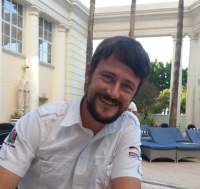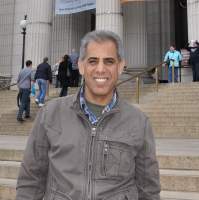- Announcements and miscellaneous
- General announcements
- Announcements and discussions regarding SuSanA
- SuSanA meetings and meetings organised by SuSanA partners
- 17th SuSanA Meeting on 31 August 2013 in Stockholm at the World Water Week -- with feedback
17th SuSanA Meeting on 31 August 2013 in Stockholm at the World Water Week -- with feedback
54.9k views
- tmsinnovation
-

- Moderator
- I manage the Decentralized Wastewater Management for Adaptation to Climate Change in Jordan (ACC Project) and previously coordinated the Climate-friendly sanitation services in peri-urban areas of Lusaka project in Zambia. My background is in Management, Economics and Information Systems.
Less- Posts: 162
- Karma: 4
- Likes received: 53
Re: Registration is now open for the 17th SuSanA Meeting on 31 August 2013 in Stockholm
Hi Ahmad
To register, open the pre-meeting page here: www.susana.org/lang-en/meetings/17th-susana-meeting-stockholm and you will see the "Register today" button. Click on the "Register today" button and then the registration form will open. Simply complete the form and then you are registered.
Kind regards
Trevor
To register, open the pre-meeting page here: www.susana.org/lang-en/meetings/17th-susana-meeting-stockholm and you will see the "Register today" button. Click on the "Register today" button and then the registration form will open. Simply complete the form and then you are registered.
Kind regards
Trevor
Trevor Surridge
Decentralized Wastewater Management for Adaptation to Climate Change in Jordan (ACC Project)
Project Manager
Deutsche Gesellschaft für
Internationale Zusammenarbeit (GIZ) GmbH
Ministry of Water and Irrigation, Shmeisani,
Amman
Jordan
Decentralized Wastewater Management for Adaptation to Climate Change in Jordan (ACC Project)
Project Manager
Deutsche Gesellschaft für
Internationale Zusammenarbeit (GIZ) GmbH
Ministry of Water and Irrigation, Shmeisani,
Amman
Jordan
The following user(s) like this post: tunio
Please Log in to join the conversation.
You need to login to reply- ahmadaltashi
-
 Less
Less- Posts: 2
- Likes received: 1
- tmsinnovation
-

- Moderator
- I manage the Decentralized Wastewater Management for Adaptation to Climate Change in Jordan (ACC Project) and previously coordinated the Climate-friendly sanitation services in peri-urban areas of Lusaka project in Zambia. My background is in Management, Economics and Information Systems.
Less- Posts: 162
- Karma: 4
- Likes received: 53
Re: Registration is now open for the 17th SuSanA Meeting on 31 August 2013 in Stockholm
Dear SuSanA community
The registration is now open for the 17th SuSanA meeting on 31 August in Stockholm.
Here is the link to the pre-meeting page: www.susana.org/lang-en/meetings/17th-susana-meeting-stockholm
The first draft agenda will also be coming out soon, I will let you also know via the forum when it comes out.
Please feel free to already post your ideas for the agenda in this discussion thread here on the forum.
Kind regards
Trevor
The registration is now open for the 17th SuSanA meeting on 31 August in Stockholm.
Here is the link to the pre-meeting page: www.susana.org/lang-en/meetings/17th-susana-meeting-stockholm
The first draft agenda will also be coming out soon, I will let you also know via the forum when it comes out.
Please feel free to already post your ideas for the agenda in this discussion thread here on the forum.
Kind regards
Trevor
Trevor Surridge
Decentralized Wastewater Management for Adaptation to Climate Change in Jordan (ACC Project)
Project Manager
Deutsche Gesellschaft für
Internationale Zusammenarbeit (GIZ) GmbH
Ministry of Water and Irrigation, Shmeisani,
Amman
Jordan
Decentralized Wastewater Management for Adaptation to Climate Change in Jordan (ACC Project)
Project Manager
Deutsche Gesellschaft für
Internationale Zusammenarbeit (GIZ) GmbH
Ministry of Water and Irrigation, Shmeisani,
Amman
Jordan
The following user(s) like this post: tunio
Please Log in to join the conversation.
You need to login to replyRe: Planning has begun for 17th SuSanA Meeting on 31 August 2013 in Stockholm
FYI:
I started a thread for a working group 1 meeting in Stockholm here:
forum.susana.org/forum/categories/54-wg-...ginning-of-sept-2013
Hot topics to be discussed:
- Current process of draft roadmap development for next 5 years, see here: forum.susana.org/forum/categories/10-by-...draft-susana-roadmap
- MOOC for sustainable sanitation courses: forum.susana.org/forum/categories/54-wg-...-its-members-a-users
Best regards, Dorothee
I started a thread for a working group 1 meeting in Stockholm here:
forum.susana.org/forum/categories/54-wg-...ginning-of-sept-2013
Hot topics to be discussed:
- Current process of draft roadmap development for next 5 years, see here: forum.susana.org/forum/categories/10-by-...draft-susana-roadmap
- MOOC for sustainable sanitation courses: forum.susana.org/forum/categories/54-wg-...-its-members-a-users
Best regards, Dorothee
WG1 Co-lead
Developing methods and tools to support strategic planning for sustainable sanitation. Particular interested in novel technologies contributing to more inclusive and circular sanitation. This email address is being protected from spambots. You need JavaScript enabled to view it.
Developing methods and tools to support strategic planning for sustainable sanitation. Particular interested in novel technologies contributing to more inclusive and circular sanitation. This email address is being protected from spambots. You need JavaScript enabled to view it.
The following user(s) like this post: tunio
Please Log in to join the conversation.
You need to login to replyRe: Planning has begun for 17th SuSanA Meeting on 31 August 2013 in Stockholm
Thanks Elisabeth for this posting
To all of you Stockholm is calling! At SEI we are looking forward to host 2013 SuSanA meeting (7th meeting we are hosting in Stockholm)! You are all welcome and we have an exiting agenda coming up with designing the paths forward for our amazing alliance.
If you are heading towards Stockholm to attend WWW make sure you arrive one day earlier and join us for the SuSanA meeting.
See you there
Madeleine
To all of you Stockholm is calling! At SEI we are looking forward to host 2013 SuSanA meeting (7th meeting we are hosting in Stockholm)! You are all welcome and we have an exiting agenda coming up with designing the paths forward for our amazing alliance.
If you are heading towards Stockholm to attend WWW make sure you arrive one day earlier and join us for the SuSanA meeting.
See you there
Madeleine
Madeleine Fogde
Program Director SIANI
Senior Project Manager at SEI
Tel +46 (0)8 6747652
Fax + 46 (0)8 6747020
Cell + 46 737078576
SKYPE mfogde71811
Kräftriket 2B
SE-10691 Stockholm
www.siani.se
www.ecosanres.org
www.sei-international.org
Program Director SIANI
Senior Project Manager at SEI
Tel +46 (0)8 6747652
Fax + 46 (0)8 6747020
Cell + 46 737078576
SKYPE mfogde71811
Kräftriket 2B
SE-10691 Stockholm
www.siani.se
www.ecosanres.org
www.sei-international.org
The following user(s) like this post: tmsinnovation, tunio
Please Log in to join the conversation.
You need to login to reply- Elisabeth
-
Topic Author
- User is blocked
- Freelance consultant since 2012
Less- Posts: 3372
- Karma: 54
- Likes received: 932
17th SuSanA Meeting on 31 August 2013 in Stockholm at the World Water Week -- with feedback
I just wanted to mention this important annoncement in case someone missed it in the June newsmail of the SuSanA secretariat:
+++++++++
Save the date: 17th SuSanA meeting on 31 August in Stockholm
Following the tradition the next SuSanA meeting is scheduled for 31 August in Stockholm, Sweden prior to the Stockholm World Water Week 2013 (SWWW). The meeting will be hosted by the Stockholm Environment Institute (SEI) and the SuSanA Secretariat (at GIZ). The working group meetings will be spread out during the SWWW and the working group leads will comunicate details in the coming weeks. Further information on the SuSanA meeting shall be circulated through a separate email soon.
Please note the working group 5 "Food security and productive sanitation systems" meeting will take place at the International Terra Preta Sanitation Conference, Hamburg, Germany on the 29 August. The discussions from the meeting that take place at the TPS will be shared via the forum with the rest of the SuSanA community.
+++++++++++++
Further information will be available in the coming weeks on the SuSanA website here:
www.susana.org/lang-en/meetings
I see there has already been a discussion in the Working Group 1 (Capacity Development) mailing list about the options for participating in one way or another without physically being there. Life stream would be ideal but I think probably not possible (costs and bandwidth issues). One thing that would definetely work is participation via Twitter (I saw there was quite a bit of twittering during the recent WEDC conference in Nakuru which made me feel like I got a glimpse of how it went).
See also here for the specific planning for a WG 1 meeting:
forum.susana.org/forum/categories/54-wg-...ginning-of-sept-2013
+++++++++
Save the date: 17th SuSanA meeting on 31 August in Stockholm
Following the tradition the next SuSanA meeting is scheduled for 31 August in Stockholm, Sweden prior to the Stockholm World Water Week 2013 (SWWW). The meeting will be hosted by the Stockholm Environment Institute (SEI) and the SuSanA Secretariat (at GIZ). The working group meetings will be spread out during the SWWW and the working group leads will comunicate details in the coming weeks. Further information on the SuSanA meeting shall be circulated through a separate email soon.
Please note the working group 5 "Food security and productive sanitation systems" meeting will take place at the International Terra Preta Sanitation Conference, Hamburg, Germany on the 29 August. The discussions from the meeting that take place at the TPS will be shared via the forum with the rest of the SuSanA community.
+++++++++++++
Further information will be available in the coming weeks on the SuSanA website here:
www.susana.org/lang-en/meetings
I see there has already been a discussion in the Working Group 1 (Capacity Development) mailing list about the options for participating in one way or another without physically being there. Life stream would be ideal but I think probably not possible (costs and bandwidth issues). One thing that would definetely work is participation via Twitter (I saw there was quite a bit of twittering during the recent WEDC conference in Nakuru which made me feel like I got a glimpse of how it went).
See also here for the specific planning for a WG 1 meeting:
forum.susana.org/forum/categories/54-wg-...ginning-of-sept-2013
Dr. Elisabeth von Muench
Freelance consultant on environmental and climate projects
Freelance consultant on environmental and climate projects
The following user(s) like this post: tmsinnovation, tunio
Please Log in to join the conversation.
You need to login to reply
Share this thread:
- Announcements and miscellaneous
- General announcements
- Announcements and discussions regarding SuSanA
- SuSanA meetings and meetings organised by SuSanA partners
- 17th SuSanA Meeting on 31 August 2013 in Stockholm at the World Water Week -- with feedback
Recently active users. Who else has been active?
Time to create page: 0.087 seconds







